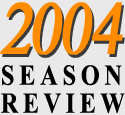
Atlas F1 News Editor
After a close fight for the title last year, the 2004 Championship was expected to be the year in which Michael Schumacher and Ferrari would be finally dethroned. The Italian outfit and the German driver, however, had other plans, and in a year of total dominance swept the opposition from start to finish. Atlas F1's Pablo Elizalde looks back at each of the 18 rounds of the 2004 season, with the hindsight of how it all ended
Winner: Michael Schumacher
But Schumacher and his team had different plans, and the season was kicked off with a big demonstration of superiority that Bernie Ecclestone tagged "a disaster" after the German driver and teammate Rubens Barrichello topped the times in every session and lapped a second a lap quicker than their rivals during an anti-climatic first race of the year. Their rivals were quick to admit they were hoping 2002 was not coming back.
Williams, who had looked very strong in pre-season testing, finished a minute off the winning Ferrari, while only the Renault of Fernando Alonso managed to stay relatively close to the red cars during the race. As impressive as their winter form was, BAR also disappointed, with Jenson Button nearly lapped by Schumacher. The biggest disappointment, however, came from McLaren, who had no pace or reliability and left Australia with a meager point.
Ferrari's dominance was not the only reason for the anti-climatic start to the new season, however. The Melbourne race also saw the introduction of new regulations, the one-engine per weekend rule and the new qualifying format being the most relevant.
The latter did not seem to have a big impact, except on Kimi Raikkonen and his Mercedes engine, while qualifying proved unpopular right from the start, not only for the fans, but also for drivers, teams, and the sport's chief. Ecclestone would then start a crusade to convince the teams to go back to the previous format, a crusade that would last nearly all year and that would have poor results.
Winner: Michael Schumacher
In the race, Schumacher did not put a foot wrong and led from start to finish despite the opposition from Juan Pablo Montoya. Williams looked better than in Australia took weeks earlier, and the Colombian made good use of the FW26 to push Schumacher hard. Montoya was never within striking distance of the German, but finishing just five seconds behind the Ferrari driver was a boost of confidence following the disappointing opening race in Melbourne.
Behind Ferrari and Williams, BAR and Jenson Button were again the strongest package and the Honda-powered squad continued with their promising start to the year. Button drove superbly to bring the BAR home in third place, which was the team's first podium on merit since they made their debut in 1999.
Renault also looked competitive at Sepang, but both Jarno Trulli and Fernando Alonso paid the price for their errors in qualifying and were never in contention in the race. McLaren, meanwhile, showed better pace than in Australia, but the same poor reliability, with Kimi Raikkonen again succumbing to engine problems while David Coulthard managed a poor sixth place.
Winner: Michael Schumacher
The track temperatures went well over 50 degrees in practice and the Michelin teams felt at home. Qualifying, however, was a different story and the Ferraris dominated, and thanks a morning shower on race day, the temperatures were not as high as predicted and the Bridgestone-Ferrari package was again untouchable. Montoya looked like the main challenger once again, but his Williams suffered from gearbox problems and the Colombian disappeared from the leading pack.
Ferrari aside, only BAR left Bahrain with a smile on their faces after Jenson Button drove another strong race to clinch his second consecutive podium. This time, he was supported by teammate Takuma Sato, who finished in fifth place despite a troubled race in which he was hindered by the overoptimism of Ralf Schumacher, who crashed into the Japanese driver.
While Renault scored somewhat strongly once again, McLaren continued with their dismal start to the year and, after three engine failures during the weekend, saw both their drivers retiring way before the race was over. Three races into the season, and the British squad were already 47 points behind Ferrari.
Winner: Michael Schumacher
The San Marino Grand Prix saw Schumacher and Ferrari scoring their fourth consecutive win in as many races as all the doom and gloom that surrounded the 2002 season started to be felt once again in the Formula One paddock. Schumacher's numbers were already more impressive than two years earlier, but the statistics did not tell how the German had dominated the four first races of the season. The Imola event was just another example of flawless driving and sheer speed.
There was some hope on Saturday when Jenson Button clinched his and BAR's first ever pole position, and when the Briton led the race from Schumacher until the first round of pitstops. As it was, however, the Ferrari driver had everything under control and sat behind the BAR until he was in clean air. Then he pushed enough to emerge in the lead and never looked back.
Button did good enough to stay relatively in touch with the German, but was never close enough to be a serious threat. The result, however, was good enough to consolidate BAR's position as Ferrari's main rivals, the team from Brackley looking stronger than Williams and Renault, who despite having all their cars in the points at the end of the race, had a pretty disappointing weekend. The San Marino Grand Prix marked the first finish for Kimi Raikkonen, although coming home in eighth place made little difference for the Finn, who a year earlier was leading the Championship.
Winner: Michael Schumacher
For the rest of the world, however, the Barcelona race offered little excitement despite Schumacher losing the lead to Jarno Trulli at the start. Like in Imola two weeks earlier, the World Champion sat behind Trulli until he had to pit, and then took the lead never to let it go. Five races into the season and Schumacher had not overtaken a single car on track, yet he went on to win them all. Rubens Barrichello made good use of his two-stop strategy to come home behind Schumacher to complete another one-two for Ferrari.
This time the Renault team was Ferrari's main rivals, with Trulli completing an excellent race to claim his first podium of the year ahead of local hero and teammate Fernando Alonso. BAR had a poor weekend after Jenson Button made a mistake in qualifying that put an end of all his hopes of a strong result on a track where the team had been tipped for victory.
Williams, meanwhile, made a costly mistake before the race, choosing too small brake ducts, and struggled to bring their cars home. Things were worse for McLaren, who despite having a trouble-free race, went on to finish outside the points and behind the Saubers, who looked stronger than the Mercedes-powered cars most of the weekend.
Winner: Jarno Trulli
The signs that Schumacher might not win this one, however, were obvious before the start of the event, with the Ferrari driver not looking as dominant as he had in the previous five races. Schumacher had to take the start from fourth place behind the Renaults and the BAR of Jenson Button, his race pace not suggesting he would have been able to win had he not gone out in a very bizarre incident. When the World Champion was leading the race with the Safety Car on track, Juan Pablo Montoya crashed into him after the German had braked heavily in the tunnel to warm up his tyres. A furious Schumacher crawled back to the pits with a three-wheeled Ferrari before retiring for the first and only time during the season.
Schumacher's exit cleared the way for Trulli, who only had Button chasing him, albeit hard, during a big part of the race. The BAR driver drove well and closed a gap of over seven seconds to get right behind the Renault driver's rear wing, but that was not enough to force Trulli into a mistake, and with overtaking proving impossible on the streets of the principality, Button had to settle for second less than a second behind the jubilant Italian.
Despite Button chasing Trulli to the flag, and despite the many incidents, the race was more or less a high speed procession that, ironically, could have been much more exciting had Schumacher not gone out of the event before the end. Rubens Barrichello was left to salvage Ferrari's honour, but after the Brazilian finished over a minute behind, there was some hope that Monaco could mark the start of a change in the pecking order. That, however, was not to be.
For Trulli, the overdue victory would be his and his team's highest point of the season. After that, it would all be downhill.
Winner: Michael Schumacher
The European Grand Prix provided a classical Schumacher victory, the German starting from pole position following a dominant display in qualifying. In the race, and once he avoided trouble at the start, he quickly disappeared into the distance until he had a comfortable enough gap, then he slowed down, kept his advantage healthy, and cruised to his sixth win in seven races. The chase for his seventh title was already not a matter of "if" but a matter of "when", with none of his rivals looking capable of giving Schumacher a run for his money.
Rubens Barrichello completed another solid drive to give Ferrari another one-two finish, although the Brazilian was never in contention for victory. Jenson Button and BAR were again the best of the rest behind the Italian squad. Despite a promising qualifying from Takuma Sato, the Japanese driver went out of the race with an engine failure which allowed Renault to continue holding on to second place in the standings despite not showing the same pace as Button.
For the Williams team, the Nurburgring race was a total disaster, with their drivers clashing at the start of the event, much to the embarrassment of the British squad. Still, the BMW-powered squad were better off than rivals McLaren, whose engine partners Mercedes saw three engines blowing up during the weekend, with two of them forcing Kimi Raikkonen and David Coulthard out of the race before the halfway point.
Winner: Michael Schumacher
Unlike the previous races the Ferrari ace had won this year, it was not clear if he had a chance to fight to victory until the halfway point of the race. Ferrari, unlike their rivals, had opted for a two-stop strategy that first relegated Schumacher in qualifying and then made him look out of contention while his brother Ralf, starting from pole, dominated at the top with the Williams.
It was looking well for the younger Schumacher until it became evident his brother was on a much longer final stint. Michael was around 13 seconds off Ralf when the Williams driver made his final stop. Michael, meanwhile, delayed his entry for several laps and, when he finally stopped in the pits, the World Champion emerged in front by some five seconds. After that, he never had to look back.
The end of the race, however, was not the end of the action: following the post-race scrutineering, both the Williams and the Toyotas were disqualified for using illegal brake cooling ducts. For the British squad it was another embarrassing moment following their disastrous race at the Nurburgring.
Winner: Michael Schumacher
The action-filled race began with a multiple-car collision at the start, and was followed by a big accident from Fernando Alonso in the Renault and then by a huge crash from Ralf Schumacher, who caused a big scare after the Williams driver stayed in the car for several laps while the medical crew tried to remove him safely from his destroyed car. Despite seeing his brother in the stricken Williams as the laps went by, Michael kept his cool and didn't let the incident affect his concentration.
Despite the challenge from an on-form Barrichello, who had beaten him to pole position, Schumacher pulled out all the stops and even overtook his teammate for the lead when it was necessary. It was the first time Schumacher had to make an on-track pass to someone for the lead in 2004, and it was fitting that it had to be Barrichello, as the Brazilian started to look stronger as the races went by.
As usual, Ferrari were the only ones who had all the reasons to celebrate at the end of the Indianapolis race, as their rivals either had reliability problems or were way off the pace. For the first time in the year, Jenson Button retired from a race, which allowed his teammate Takuma Sato to star and clinch his first Formula One podium. Despite Button's exit, BAR had a better weekend than their rivals, as Renault saw only Jarno Trulli finishing the race and McLaren crossed under the chequered flag a lap behind the winner.
As for Williams, things continued to look dim, as not only Ralf would be forced to sit out the following six races, but Juan Pablo Montoya was disqualified from the race for the second year in succession at Indianapolis and for the second race in a row in 2004.
Winner: Michael Schumacher
Alonso had placed himself as one of the favourites for victory after scoring his first pole position of the season with a car which looked extremely competitive at the French circuit. The Spaniard was also looking strongly in the race, and a win was in the charts as Schumacher was stuck behind and didn't seem capable of doing anything about it, at least on track. But then Ferrari decided they had nothing to lose and changed their strategy to allow their driver to run in clean air with the quickest car of the field.
Schumacher didn't disappoint, and in a tour de force, the German completed a fast lap after another to emerge in the lead after making his final stop. Alonso was then the man chasing and there was little he could do to stop Schumacher from coming home in first place, the German celebrating his ninth victory in tenth races. Renault would not have had a bad day had Jarno Trulli not let Rubens Barrichello pass him for third place on the final lap, a move which kicked off a bout of criticism that will see the Italian driver leaving Renault a few races later.
BAR had a poor weekend, with only Jenson Button scoring points while Takuma Sato went out with engine problems, which allowed Renault to consolidate their second place in the standings. Behind them, Williams had another torrid weekend and both Juan Pablo Montoya and Marc Gene - replacing Ralf Schumacher - failed to finish in the points. McLaren, meanwhile, introduced their revised car and things immediately looked better despite leaving France with only a sixth and a seventh places.
Winner: Michael Schumacher
If in France, the Ferrari driver had won after going against the odds and using a four-stop strategy, at Silverstone it was a two-stopper - against his rivals' three - which helped the German clinch the tenth victory of the season. The result proved that perhaps it was not a case of Schumacher always choosing the right strategy, but rather that any strategy works when the World Champion uses it.
Following its promising debut a week earlier, the MP4-19B proved McLaren were back on the right track after Kimi Raikkonen emerged as Schumacher's main challenger. The Finn led the race and even looked like he had a chance to win at some stages. However, it was just an illusion as Schumacher was untouchable once he jumped ahead of Raikkonen in the pits. A late Safety Car entry following a huge crash from Jarno Trulli reduced Schumacher's gap considerably, but the end result did not reflect the reality of the race.
While McLaren were the team on the up, BAR and Jenson Button were the big disappointment of the weekend, the Briton unable to even fight for a podium position despite all the hopes from the British fans to see him as a race winner. Still, they were better off than Renault, who had neither car in the points at the end of the race as BAR began to catch up the French squad in the Championship. Williams had another poor weekend and even looked slower than the Saubers, who were once more the best outside the top five, with Giancarlo Fisichella completing a superb drive which was rewarded with sixth place.
Winner: Michael Schumacher
When it's all said and done, however, the only thing that counts is who crossed the finish line in first place, and this time it was again Schumacher. Button was very strong all weekend, but following his engine failure the Briton had to take the start from the back of the grid and his chances of victory were gone. Still, Button drove the race of his life and recovered spectacularly to finish just around eight seconds behind Schumacher, who in the end had little opposition on his way to the 81st Grand Prix win of his career.
Raikkonen, too, could have won the race had his McLaren not lost the rear wing while he was fighting for the win with Schumacher, but the Woking-based squad's poor reliability was again highlighted on the day when Schumacher completed his 50th Formula One Grand Prix without a mechanical failure. For the first time in the season, Schumacher saw his teammate Rubens Barrichello failing to score, finally putting the German within striking distance of a title which would have been his some time before but not for the current points system.
The action for most of the race, however, was not on top but rather further behind, where several drivers offered a lot of quality wheel-to-wheel racing without incidents. Button, Juan Pablo Montoya, Fernando Alonso and Mark Webber were among those who gave the German fans their money's worth as they battled it out for the point-scoring positions.
Winner: Michael Schumacher
As it was, perhaps thankfully for the sport, Schumacher settled to lap everyone but the other four drivers in the top five, although Juan Pablo Montoya and Jenson Button well were over a minute behind the Ferrari driver, who did not put a foot wrong after taking the start from pole position. The race was a non-event, and the only changes in position - apart from Antonio Pizzonia passing Giancarlo Fisichella in the pits - came from the retirements.
At the top, Schumacher cruised for his 12th win in 13 races as Ferrari completed their seventh one-two of the season to secure their sixth consecutive constructors' title. Fernando Alonso, who last year had lapped Schumacher on his way to the first victory of his career, had to settle for a distant third place this time, which was the best possible result that day. The bad news was that, even without the Ferraris, the Hungarian Grand Prix would have been a tedious event anyway.
Everybody except Ferrari left Hungary with few reasons to be happy with their performances and with the sport surrounded by a cloud of doom.
Winner: Kimi Raikkonen
The Belgian Grand Prix, returning to the Formula One calendar after a year's absence, not only provided an unexpected winner, but also offered a tremendous show that the sport very much needed following the utter boredom of the Hungaroring. Several incidents, six different cars in the lead, and a lot of racing showed the decision makers some races need to be on the calendar even if the teams are not allowed to display their tobacco ads. The Spa race revitalized F1 in a very difficult moment.
That Michael Schumacher finally clinched his seventh world title seemed to matter little, as it had been expected for weeks. Or perhaps the fact that he clinched it by finishing second after seven consecutive victories left a feeling of disappointment for the German. But as it turned out, Schumacher was not as strong as Kimi Raikkonen in the race, the Finn driving flawlessly despite the Ferrari driver's pressure.
Raikkonen and McLaren coped better with the tricky conditions and with the three Safety Car periods to emerge ahead of his rivals every time the Finn pitted. It was a sweet redemption for the Mercedes-powered team after being heavily criticised for their performance throughout the year.
Few were the drivers who managed to escape problems during a race which resembled a destruction derby. Fernando Alonso, Antonio Pizzonia and Ricardo Zonta were among those who starred in the race only to succumb to some sort of problem in the end.
Winner: Rubens Barrichello
Pole-sitter Rubens Barrichello and Michael Schumacher had to overcome major difficulties to reverse their poor starts, the Brazilian having lost a lot of ground after starting the race with the wrong tyres, and the German having to charge back from the back of the field after spinning on the opening lap, when the track was slightly damp due to the morning rain. But despite the difficulties, Ferrari read the race better than anyone else and after 43 laps both men were back on top.
This time, and although Schumacher looked faster, it was Barrichello's turn to win, the Brazilian finally scoring an overdue first victory of the season. Ferrari's main rival during the race was again Jenson Button, the Briton putting on a strong performance that, for some time, made him look like a winner. In the end, however, the Ferraris were unbeatable and the BAR driver had to settle for third.
Juan Pablo Montoya and Kimi Raikkonen also looked like having a chance to win at one stage of the race. But the Finn retired with mechanical problems and the Colombian's pace dropped off so badly he disappeared from the leading positions before the middle of the race. At the end of the day, Ferrari had achieved their goal and Monza was a red party.
Winner: Rubens Barrichello
With the World Champion out of the running, the race, tagged commercially the most important in the history of the sport, offered a good show to the Chinese people, with three drivers fighting for victory until the final moments. Rubens Barrichello, Jenson Button and Kimi Raikkonen all looked like potential winners at one stage of the race, but it would be the Brazilian Ferrari driver who would continue with his momentum to clinch his second win in a row.
Barrichello drove a flawless race despite the pressure from both Button and Raikkonen, and celebrated his victory by soaking Ferrari president Luca di Montezemolo with champagne in a rare visit from the Italian to the podium. Raikkonen would have probably finished second had McLaren not gambled on a different strategy aimed at passing Barrichello. The risk didn't pay off and as a result it was Button who took the runner-up spot thanks to a two-stop strategy.
The Chinese race marked the return to racing of Jacques Villeneuve, who replaced Jarno Trulli at Renault in the hope of helping the French squad in their battle for second place with BAR. Villeneuve's comeback, however, would be disappointing, as he would finish down in 11th place. Ralf Schumacher also returned to racing action in China following his accident at Indianapolis, the Williams driver showing excellent form until David Coulthard crashed into him.
Winner: Michael Schumacher
The threat from the Ma-on typhoon forced organisers to close the circuit on Saturday, and there were also fears that the race would not take place if the damages were too big to hold the event. The threat, however, would only be that, as Ma-on changed direction and missed Suzuka. Qualifying, however, had already been rescheduled for Sunday morning, a first in Formula One. Two weeks later, the FIA would announce plans for 2005 to have one of the qualifying sessions of Sunday.
Ferrari and Michael Schumacher seemed to have been doing one-day Grands Prix forever, and they coped perfectly with the hectic Sunday. The German driver was dominant in qualifying and in a league of his own during the race, which he dominated right from the start. Only his brother Ralf in the Williams managed to stay relatively in touch with the Ferrari driver, who hit back strongly following his disastrous Chinese Grand Prix.
Ralf continued with his momentum after his return to racing and had a very good race, being Williams' top man for most of the weekend. Although that was not enough to trouble his brother, it meant Ralf's return to the podium for the first time since 2003. BAR also had a good weekend, and thanks to Jenson Button's 10th podium, the Honda-powered squad left Japan assured of clinching second place in the standings as Renault continued to falter, with only Fernando Alonso scoring as Jacques Villeneuve struggled for pace.
Winner: Juan Pablo Montoya
After ten failed attempts to finish his home Grand Prix in the points, Rubens Barrichello was the main favourite for victory, especially after his teammate Michael Schumacher had crashed in practice, which forced him to change his car and engine before qualifying, which meant he started the race already out of contention. Barrichello had the perfect start, seizing his second consecutive pole position at Interlagos, but the conditions come race day would played against the Ferrari driver.
Rain on Sunday, which left the track damp, meant the Michelin runners were at an advantage for most of the race, and that was obvious right from the start. Although the circuit dried up, the Ferraris were never in contention, and first Fernando Alonso, and then Kimi Raikkonen and Juan Pablo Montoya emerged at the top. The Williams driver, who had been very strong all weekend, led for most of the event with the Finn following closely while the rest of the field was already miles behind. Despite the best of his efforts, Raikkonen was unable to pass Montoya or force him into a mistake, and the Colombian went on to take his and Williams' first win in over a year in the Colombian's final race for the BMW-powered team.
Racing, however, was nearly in a secondary role during the weekend, as the event was overshadowed by the controversy arisen when all teams, except Ferrari, voted for some radical new measures for 2005. It was a controversial ending for a controversial season, and the future of the sport continued to look uncertain.
Round 1: Australia Ferrari's Stern Warning
Pole Position: Michael Schumacher (1:24.408)
Fastest Lap: Michael Schumacher (1:24.125)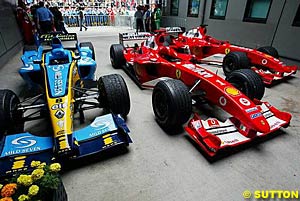 Much was expected from the season-opening race following the dramatic end of 2003. Everyone agreed Ferrari had been caught at the end of the previous year, and with Michael Schumacher having shown an unusual poor form in the final races of 2003, many pundits predicted the Australian Grand Prix would be the beginning of the end of Ferrari's and Schumacher's supremacy.
Much was expected from the season-opening race following the dramatic end of 2003. Everyone agreed Ferrari had been caught at the end of the previous year, and with Michael Schumacher having shown an unusual poor form in the final races of 2003, many pundits predicted the Australian Grand Prix would be the beginning of the end of Ferrari's and Schumacher's supremacy.
Drivers: Constructors:
1. M.Schumacher 10 1. Ferrari 18
2. Barrichello 8 2. Williams-BMW 9
3. Alonso 6 3. Renault 8
4. R.Schumacher 5 4. BAR-Honda 3
5. Montoya 4 5 McLaren-Mercedes 1
6. Button 3
7. Trulli 2
8. Coulthard 1
Round 2: Malaysia Cold or Hot, Schumacher Again
Pole Position: Michael Schumacher (1:33.074)
Fastest Lap: Juan Pablo Montoya (1:34.223)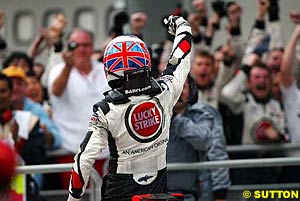 The coolish conditions in Australia played in favour of Ferrari and Bridgestone and everybody was expecting a much closer race in the heat of Sepang. And so it was, and Michael Schumacher didn't come close to lapping the whole field, but the German World Champion was again unstoppable. In qualifying, a superb flying lap put him over half a second in front of the surprising Mark Webber, who gave Jaguar a boost with their first ever front row start.
The coolish conditions in Australia played in favour of Ferrari and Bridgestone and everybody was expecting a much closer race in the heat of Sepang. And so it was, and Michael Schumacher didn't come close to lapping the whole field, but the German World Champion was again unstoppable. In qualifying, a superb flying lap put him over half a second in front of the surprising Mark Webber, who gave Jaguar a boost with their first ever front row start.
Drivers: Constructors:
1. M.Schumacher 20 1. Ferrari 33
2. Barrichello 13 2. Williams-BMW 17
3. Montoya 12 3. Renault 14
4. Button 9 4. BAR-Honda 9
5. Alonso 8 5. McLaren-Mercedes 4
6. Trulli 6 6. Sauber-Petronas 1
7. R.Schumacher 5
8. Coulthard 4
Round 3: Bahrain Schumacher, King of the Desert
Pole Position: Michael Schumacher (1:30.139)
Fastest Lap: Michael Schumacher (1:30.252)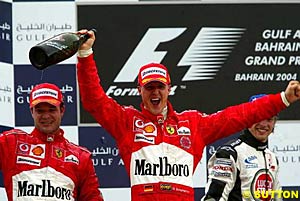 If the Malaysian Grand Prix had offered some hope to Michael Schumacher's rivals after the German won by a small margin over Juan Pablo Montoya, the first ever race in Bahrain was a blow that took them back to the disappointing reality: Ferrari and their driver were still in a class of their own and no one looked capable of stopping them. On a circuit place in the middle of a the desert, the high temperatures were supposed to benefit the Michelin runners but, like in Sepang, that was not enough to beat Schumacher.
If the Malaysian Grand Prix had offered some hope to Michael Schumacher's rivals after the German won by a small margin over Juan Pablo Montoya, the first ever race in Bahrain was a blow that took them back to the disappointing reality: Ferrari and their driver were still in a class of their own and no one looked capable of stopping them. On a circuit place in the middle of a the desert, the high temperatures were supposed to benefit the Michelin runners but, like in Sepang, that was not enough to beat Schumacher.
Drivers: Constructors:
1. M.Schumacher 30 1. Ferrari 51
2. Barrichello 21 2. Renault 22
3. Button 15 3. Williams-BMW 19
4. Montoya 12 = BAR-Honda 19
5. Alonso 11 5. McLaren-Mercedes 4
= Trulli 11 6. Sauber-Petronas 1
7. R.Schumacher 7 = Jaguar-Cosworth 1
8. Sato 4
Round 4: San Marino More of the Same
Pole Position: Jenson Button (1:19.753)
Fastest Lap: Michael Schumacher (1:20.411)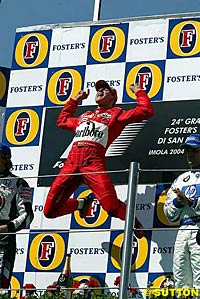 "Michael's only rival is himself," reflected BAR boss David Richards after Schumacher equalled his best start to a Formula One season with victory at the first of the European races. "He has nobody else out there that can hold a torch to him at the moment." That was indeed the case at Imola, during a race weekend which marked the tenth anniversary of the deaths of Ayrton Senna and Roland Ratzenberger.
"Michael's only rival is himself," reflected BAR boss David Richards after Schumacher equalled his best start to a Formula One season with victory at the first of the European races. "He has nobody else out there that can hold a torch to him at the moment." That was indeed the case at Imola, during a race weekend which marked the tenth anniversary of the deaths of Ayrton Senna and Roland Ratzenberger.
Drivers: Constructors:
1. M.Schumacher 40 1. Ferrari 64
2. Barrichello 24 2. Renault 31
3. Button 23 3. Williams-BMW 27
4. Montoya 18 = BAR-Honda 27
5. Alonso 16 5. McLaren-Mercedes 5
6. Trulli 15 6. Sauber-Petronas 1
7. R.Schumacher 9 = Jaguar-Cosworth 1
8. Sato 4
Round 5: Spain Seventy-Five and Counting
Pole Position: Michael Schumacher (1:15.022)
Fastest Lap: Michael Schumacher (1:17.450)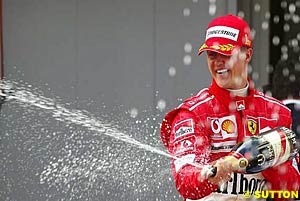 When Michael Schumacher grabbed pole position by over half a second after a flying lap that was far from perfect, it was not hard to know what to expect from the Spanish Grand Prix. There were no surprises, and Schumacher took his fifth consecutive win of the season in a predictable and processional race which saw the Ferrari driver dominating despite a hole in an exhaust pipe that had both team and driver worried for part of the event.
When Michael Schumacher grabbed pole position by over half a second after a flying lap that was far from perfect, it was not hard to know what to expect from the Spanish Grand Prix. There were no surprises, and Schumacher took his fifth consecutive win of the season in a predictable and processional race which saw the Ferrari driver dominating despite a hole in an exhaust pipe that had both team and driver worried for part of the event.
Drivers: Constructors:
1. M.Schumacher 50 1. Ferrari 82
2. Barrichello 32 2. Renault 42
3. Button 24 3. BAR-Honda 32
4. Alonso 21 4. Williams-BMW 30
5. Trulli 21 5. McLaren-Mercedes 5
6. Montoya 18 6. Sauber-Petronas 3
7. R.Schumacher 12 7. Jaguar-Cosworth 1
8. Sato 8
Round 6: Monaco The Streets are Alive
Pole Position: Jarno Trulli (1:13.985)
Fastest Lap: Michael Schumacher (1:14.439)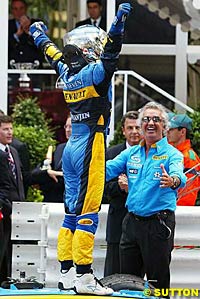 Formula One took a breath of fresh air at Monte Carlo after one of the most one-sided starts to a season, with Michael Schumacher finally failing to win, or finish, a race, which meant a new winner both in 2004 and in the sport, as Jarno Trulli finally scored his maiden victory. Truth be said, the sport needed a break following Schumacher's perfect start to the year and Monaco, as it's usually the case, delivered the unexpected after an incident-filled race.
Formula One took a breath of fresh air at Monte Carlo after one of the most one-sided starts to a season, with Michael Schumacher finally failing to win, or finish, a race, which meant a new winner both in 2004 and in the sport, as Jarno Trulli finally scored his maiden victory. Truth be said, the sport needed a break following Schumacher's perfect start to the year and Monaco, as it's usually the case, delivered the unexpected after an incident-filled race.
Drivers: Constructors:
1. M.Schumacher 50 1. Ferrari 88
2. Barrichello 38 2. Renault 52
3. Button 32 3. BAR-Honda 40
4. Trulli 31 4. Williams-BMW 35
5. Montoya 23 5. Sauber-Petronas 7
6. Alonso 21 6. McLaren-Mercedes 5
7. R.Schumacher 12 7. Toyota 4
8. Sato 8 8. Jordan-Ford 2
Round 7: Europe No Place Like Home for Schumacher
Pole Position: Michael Schumacher (1:28.351)
Fastest Lap: Michael Schumacher (1:29.468)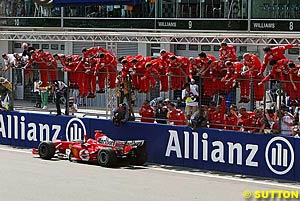 Monaco offered some hope to those wishing for a close Championship fight, but they needed just seven days to get back to reality after Michael Schumacher crushed the opposition at the Nurburgring, beginning a winning streak that would go on until the Hungarian Grand Prix four months later. The World Champion had made it clear he was hungry for victory after the disappointment of Monaco, and in his home race he gave the opposition no chance of even getting close.
Monaco offered some hope to those wishing for a close Championship fight, but they needed just seven days to get back to reality after Michael Schumacher crushed the opposition at the Nurburgring, beginning a winning streak that would go on until the Hungarian Grand Prix four months later. The World Champion had made it clear he was hungry for victory after the disappointment of Monaco, and in his home race he gave the opposition no chance of even getting close.
Drivers: Constructors:
1. M.Schumacher 60 1. Ferrari 106
2. Barrichello 46 2. Renault 61
3. Button 38 3. BAR-Honda 46
4. Trulli 36 4. Williams-BMW 36
5. Alonso 25 5. Sauber-Petronas 10
6. Montoya 24 6. McLaren-Mercedes 5
7. R.Schumacher 12 7. Toyota 4
8. Sato 8 8. Jaguar-Cosworth 3
Round 8: Canada Super Schumacher
Pole Position: Ralf Schumacher (1:12.275)
Fastest Lap: Rubens Barrichello (1:13.622)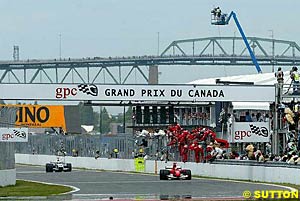 Even after starting from sixth position on the grid, Michael Schumacher showed he had no rivals this season with his seventh win in eight races in what was the most difficult and probably the most satisfying of all the victories he had achieved up to that point in the year. This time the German Ferrari driver did not look as dominant as in previous occasions, yet his mastery eventually shone through to give him a record-breaking seventh win in Canada. No other driver in Formula One history had won the same event so many times. Seven was Schumacher's number over the weekend, as it was also his 77th F1 win.
Even after starting from sixth position on the grid, Michael Schumacher showed he had no rivals this season with his seventh win in eight races in what was the most difficult and probably the most satisfying of all the victories he had achieved up to that point in the year. This time the German Ferrari driver did not look as dominant as in previous occasions, yet his mastery eventually shone through to give him a record-breaking seventh win in Canada. No other driver in Formula One history had won the same event so many times. Seven was Schumacher's number over the weekend, as it was also his 77th F1 win.
Drivers: Constructors:
1. M.Schumacher 70 1. Ferrari 124
2. Barrichello 54 2. Renault 61
3. Button 44 3. BAR-Honda 52
4. Trulli 36 4. Williams-BMW 36
5. Alonso 25 5. Sauber-Petronas 15
6. Montoya 24 6. McLaren-Mercedes 12
7. R.Schumacher 12 7. Jordan-Ford 5
8. Fisichella 10 8. Toyota 4
Round 9: USA Schumacher Despite Barrichello
Pole Position: Rubens Barrichello (1:10.223)
Fastest Lap: Rubens Barrichello (1:10.399)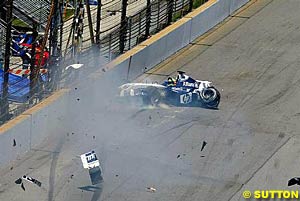 The United States Grand Prix saw Michael Schumacher scoring yet another win but, like in Canada just the week before, the race provided plenty of entertainment, showing that despite the German World Champion's total dominance in the Championship, the racing could be close. This time it was a more combative and competitive Rubens Barrichello who made his Ferrari teammate work for his victory as the Italian squad celebrated yet another one-two finish.
The United States Grand Prix saw Michael Schumacher scoring yet another win but, like in Canada just the week before, the race provided plenty of entertainment, showing that despite the German World Champion's total dominance in the Championship, the racing could be close. This time it was a more combative and competitive Rubens Barrichello who made his Ferrari teammate work for his victory as the Italian squad celebrated yet another one-two finish.
Drivers: Constructors:
1. M.Schumacher 80 1. Ferrari 142
2. Barrichello 62 2. Renault 66
3. Button 44 3. BAR-Honda 58
4. Trulli 41 4. Williams-BMW 36
5. Alonso 25 5. McLaren-Mercedes 17
6. Montoya 24 6. Sauber-Petronas 15
7. Sato 14 7. Toyota 8
8. R.Schumacher 12 8. Jordan-Ford 5
Round 10: France Tour de Force
Pole Position: Fernando Alonso (1:13.698)
Fastest Lap: Michael Schumacher (1:15.377)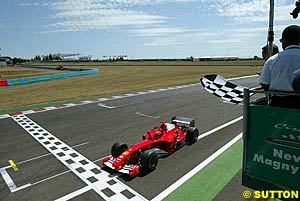 Michael Schumacher and Ferrari continued to be made to sweat for victory, but at the end of the day the German champion showed he and his team were a step ahead of their rivals and managed to move a step closer to the goal of clinching his seventh title. In France, Schumacher's main rival was Fernando Alonso in the Renault, who were hoping for a home victory but who had to be content with second place after Ferrari pulled a strategic masterclass which saw Schumacher winning after making four pitstops.
Michael Schumacher and Ferrari continued to be made to sweat for victory, but at the end of the day the German champion showed he and his team were a step ahead of their rivals and managed to move a step closer to the goal of clinching his seventh title. In France, Schumacher's main rival was Fernando Alonso in the Renault, who were hoping for a home victory but who had to be content with second place after Ferrari pulled a strategic masterclass which saw Schumacher winning after making four pitstops.
Drivers: Constructors:
1. M.Schumacher 90 1. Ferrari 158
2. Barrichello 68 2. Renault 79
3. Button 48 3. BAR-Honda 62
4. Trulli 46 4. Williams-BMW 37
5. Alonso 33 5. McLaren-Mercedes 22
6. Montoya 25 6. Sauber-Petronas 15
7. Sato 14 7. Toyota 8
8. Coulthard 12 8. Jordan-Ford 5
Round 11: Britain Schumacher's Perfect 10
Pole Position: Kimi Raikkonen (1:18.233)
Fastest Lap: Michael Schumacher (1:18.739)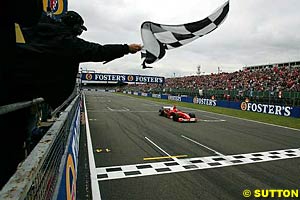 If there ever was a circuit where his rivals were hoping to beat Michael Schumacher, it was Silverstone, where the German driver has a poor record by his standards. It was not to be, as the Ferrari driver looked in total control of the Silverstone race despite having as much as three drivers separating him from the lead during the opening part of the event.
If there ever was a circuit where his rivals were hoping to beat Michael Schumacher, it was Silverstone, where the German driver has a poor record by his standards. It was not to be, as the Ferrari driver looked in total control of the Silverstone race despite having as much as three drivers separating him from the lead during the opening part of the event.
Drivers: Constructors:
1. M.Schumacher 100 1. Ferrari 174
2. Barrichello 74 2. Renault 79
3. Button 53 3. BAR-Honda 67
4. Trulli 46 4. Williams-BMW 41
5. Alonso 33 5. McLaren-Mercedes 32
6. Montoya 29 6. Sauber-Petronas 18
7. Raikkonen 18 7. Toyota 8
8. Coulthard 14 8. Jordan-Ford 5
Round 12: Germany If Only...
Pole Position: Michael Schumacher (1:13.306)
Fastest Lap: Kimi Raikkonen (1:13.780)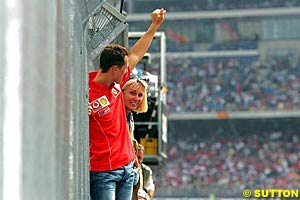 The German Grand Prix was an event full of "ifs", but at the end of the day it was again Michael Schumacher who emerged victorious for the 11th time in 12 races. Jenson Button could have scored his maiden Formula One victory if his Honda engine had not broken down in practice; Kimi Raikkonen could have fought for victory if his McLaren had not suffered a mechanical problem early on...
The German Grand Prix was an event full of "ifs", but at the end of the day it was again Michael Schumacher who emerged victorious for the 11th time in 12 races. Jenson Button could have scored his maiden Formula One victory if his Honda engine had not broken down in practice; Kimi Raikkonen could have fought for victory if his McLaren had not suffered a mechanical problem early on...
Drivers: Constructors:
1. M.Schumacher 110 1. Ferrari 184
2. Barrichello 74 2. Renault 85
3. Button 61 3. BAR-Honda 76
4. Trulli 46 4. Williams-BMW 47
5. Alonso 39 5. McLaren-Mercedes 37
6. Montoya 33 6. Sauber-Petronas 18
7. Coulthard 19 7. Toyota 8
8. Raikkonen 18 8. Jaguar-Racing 7
Round 13: Hungary Formula Yawn
Pole Position: Michael Schumacher (1:19.146)
Fastest Lap: Michael Schumacher (1:19.071)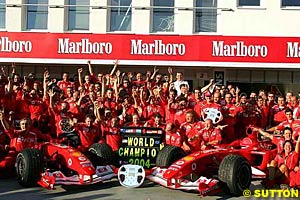 It was almost predictable that in the most one-sided of seasons, the Hungarian Grand Prix, usually a race which provides little excitement, would be a dull event. But probably few would have expected the Hungarian race to be such a soporific affair in which there was not a newsworthy moment of action and which Michael Schumacher dominated from start to finish, giving the impression that he could have ended up lapping the whole field if it was necessary.
It was almost predictable that in the most one-sided of seasons, the Hungarian Grand Prix, usually a race which provides little excitement, would be a dull event. But probably few would have expected the Hungarian race to be such a soporific affair in which there was not a newsworthy moment of action and which Michael Schumacher dominated from start to finish, giving the impression that he could have ended up lapping the whole field if it was necessary.
Drivers: Constructors:
1. M.Schumacher 120 1. Ferrari 202
2. Barrichello 82 2. Renault 91
3. Button 65 3. BAR-Honda 83
4. Trulli 46 4. Williams-BMW 54
5. Alonso 45 5. McLaren-Mercedes 37
6. Montoya 38 6. Sauber-Petronas 19
7. Coulthard 19 7. Toyota 8
8. Sato 18 8. Jaguar-Cosworth 7
Round 14: Belgium The Spa Redemption
Pole Position: Jarno Trulli (1:56.232)
Fastest Lap: Kimi Raikkonen (1:45.108)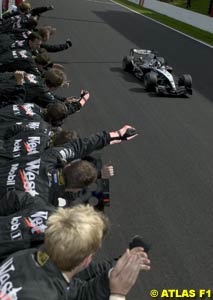 It is well know by now that a Formula One journalist said he would run naked around Silverstone if McLaren won a race in 2004. Judging by the Woking team's form at the start of the year, many people agreed it was a safe bet to do. How wrong they were, for McLaren completed at Spa an amazing comeback from the doldrums to clinch their first victory of the year.
It is well know by now that a Formula One journalist said he would run naked around Silverstone if McLaren won a race in 2004. Judging by the Woking team's form at the start of the year, many people agreed it was a safe bet to do. How wrong they were, for McLaren completed at Spa an amazing comeback from the doldrums to clinch their first victory of the year.
Drivers: Constructors:
1. M.Schumacher 128 * 1. Ferrari 216 *
2. Barrichello 88 2. Renault 91
3. Button 65 3. BAR-Honda 83
4. Trulli 46 4. Williams-BMW 54
5. Alonso 45 5. McLaren-Mercedes 49
6. Montoya 38 6. Sauber-Petronas 28
7. Raikkonen 28 7. Jaguar-Cosworth 10
8. Coulthard 21 8. Toyota
Round 15: Italy Ferrari's Masterclass
Pole Position: Rubens Barrichello (1:20.089)
Fastest Lap: Rubens Barrichello (1:21.046)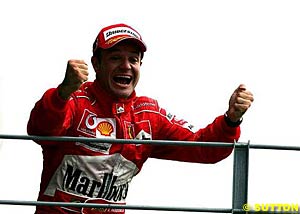 The Italian Grand Prix highlighted Ferrari's season of total dominance with a display of sheer superiority after a difficult start to the race. The World Champions arrived at Monza confident of celebrating their perfect year with another win at their temple, but things went wrong at the start and for a moment it looked like the tifosi would see their team falter at the worst possible moment.
The Italian Grand Prix highlighted Ferrari's season of total dominance with a display of sheer superiority after a difficult start to the race. The World Champions arrived at Monza confident of celebrating their perfect year with another win at their temple, but things went wrong at the start and for a moment it looked like the tifosi would see their team falter at the worst possible moment.
Drivers: Constructors:
1. M.Schumacher 136 1. Ferrari 234
2. Barrichello 98 2. BAR-Honda 94
3. Button 71 3. Renault 91
4. Trulli 46 4. Williams-BMW 60
5. Alonso 45 5. McLaren-Mercedes 52
6. Montoya 42 6. Sauber-Petronas 29
7. Raikkonen 28 7. Jaguar-Cosworth 10
8. Coulthard 24 8. Toyota 9
Round 16: China Barrichello Wins on Schumacher's Day Off
Pole Position: Rubens Barrichello (1:34.012)
Fastest Lap: Michael Schumacher (1:32.238)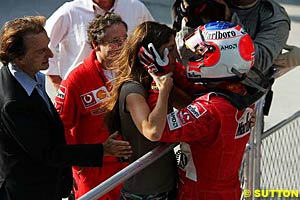 The inaugural Chinese Grand Prix served as an example of what life would be like in Formula One if Michael Schumacher were not there. Having finished first or second in all the races since the European Grand Prix nearly four months earlier, the Ferrari driver had a disastrous weekend in Shanghai and looked human probably for the first time in the season, first making a mistake in qualifying and then enduring a troubled race which saw him finishing in a career low 12th position.
The inaugural Chinese Grand Prix served as an example of what life would be like in Formula One if Michael Schumacher were not there. Having finished first or second in all the races since the European Grand Prix nearly four months earlier, the Ferrari driver had a disastrous weekend in Shanghai and looked human probably for the first time in the season, first making a mistake in qualifying and then enduring a troubled race which saw him finishing in a career low 12th position.
Drivers: Constructors:
1. M.Schumacher 136 1. Ferrari 244
2. Barrichello 108 2. BAR-Honda 105
3. Button 79 3. Renault 96
4. Alonso 50 4. Williams-BMW 64
5. Trulli 46 5. McLaren-Mercedes 58
6. Montoya 46 6. Sauber-Petronas 32
7. Raikkonen 34 7. Jaguar-Cosworth 10
8. Sato 26 8. Toyota 9
Round 17: Japan The One-Day Grand Prix
Pole Position: Michael Schumacher (1:33.542)
Fastest Lap: Rubens Barrichello (1:32.730)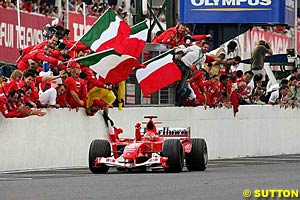 Formula One found the perfect excuse to try something many of the powers that be had wanted to implement for some time: a two-day Grand Prix weekend. Although in the end it would turn out to be a one-day Grand Prix, because the very heavy rain on Friday made it almost impossible for anyone to complete a significant amount of laps.
Formula One found the perfect excuse to try something many of the powers that be had wanted to implement for some time: a two-day Grand Prix weekend. Although in the end it would turn out to be a one-day Grand Prix, because the very heavy rain on Friday made it almost impossible for anyone to complete a significant amount of laps.
Drivers: Constructors:
1. M.Schumacher 146 1. Ferrari 254
2. Barrichello 108 2. BAR-Honda 116
3. Button 85 3. Renault 100
4. Alonso 54 4. Williams-BMW 74
5. Montoya 48 5. McLaren-Mercedes 61
6. Trulli 46 6. Sauber-Petronas 33
7. Raikkonen 37 7. Jaguar-Cosworth 10
8. Sato 31 8. Toyota 9
Round 18: Brazil Montoya's Victorious Farewell
Pole Position: Rubens Barrichello (1:10.646)
Fastest Lap: Juan Pablo Montoya (1:11.473)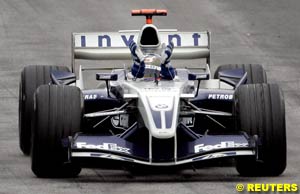 There was not much at stake coming to the final race of the season. Most of the top Championship positions had already been decided: BAR had all but secured second place behind Ferrari in Japan and Williams had a healthy lead over McLaren. The season-ending Grand Prix, however, was important for BAR, who were aiming to put the icing on the cake with their first win of the year. In the end, however, it was not to be.
There was not much at stake coming to the final race of the season. Most of the top Championship positions had already been decided: BAR had all but secured second place behind Ferrari in Japan and Williams had a healthy lead over McLaren. The season-ending Grand Prix, however, was important for BAR, who were aiming to put the icing on the cake with their first win of the year. In the end, however, it was not to be.
Drivers: Constructors:
1. M.Schumacher 148 WC 1. Ferrari 262 CC
2. Barrichello 114 2. BAR-Honda 119
3. Button 85 3. Renault 105
4. Alonso 59 4. Williams-BMW 88
5. Montoya 58 5. McLaren-Mercedes 69
6. Trulli 46 6. Sauber-Petronas 34
7. Raikkonen 45 7. Jaguar-Cosworth 10
8. Sato 34 8. Toyota 9
9. R.Schumacher 24 (1x2) 9. Jordan-Ford 5
10. Coulthard 24 (1x4) 10. Minardi-Cosworth 1
11. Fisichella 22
12. Massa 12
13. Webber 7
14. Panis 6 (1x5)
15. Pizzonia 6 (3x7)
16. Klien 3 (1x6, 1x9, 2x10)
17. da Matta 3 (1x6, 1x9, 1x10)
18. Heidfeld 3 (1x7)
19. Glock 2
20. Baumgartner 1
21. Villeneuve 0 (2x10)
22. Zonta 0 (1x10, 1x11)
23. Gene 0 (1x10, 1x12)
24. Pantano 0 (2x13)
25. Bruni 0 (3x14)
Please Contact Us for permission to republish this or any other material from Atlas F1.
|
Volume 10, Issue 44
2004 Season Review
The Atlas F1 Top Ten
2004 Race-by-Race Review
2004 Drivers Review
2004 Teams Review
2004 Technical Review
Bjorn Wirdheim: Going Places
2004 Qualifying Differentials
Columns
On the Road
Elsewhere in Racing
> Homepage |
